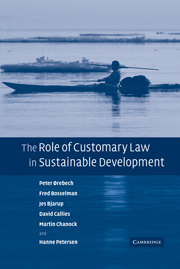Book contents
- Frontmatter
- Contents
- Preface
- Acknowledgements
- Table of cases
- List of international conventions
- Introduction
- 1 The linkage between sustainable development and customary law
- 2 Three case studies from Hawaii, Norway and Greenland
- 3 Social interaction: the foundation of customary law
- 4 How custom becomes law in England
- 5 How custom becomes law in Norway
- 6 Adaptive resource management through customary law
- 7 The place of customary law in democratic societies
- 8 Customary law, sustainable development and the failing state
- 9 Towards sustainability: the basis in international law
- 10 The case studies revisited
- 11 The choice of customary law
- 12 Conclusion: customary law in a globalizing culture
- References
- Index
- Authors index
1 - The linkage between sustainable development and customary law
Published online by Cambridge University Press: 18 December 2009
- Frontmatter
- Contents
- Preface
- Acknowledgements
- Table of cases
- List of international conventions
- Introduction
- 1 The linkage between sustainable development and customary law
- 2 Three case studies from Hawaii, Norway and Greenland
- 3 Social interaction: the foundation of customary law
- 4 How custom becomes law in England
- 5 How custom becomes law in Norway
- 6 Adaptive resource management through customary law
- 7 The place of customary law in democratic societies
- 8 Customary law, sustainable development and the failing state
- 9 Towards sustainability: the basis in international law
- 10 The case studies revisited
- 11 The choice of customary law
- 12 Conclusion: customary law in a globalizing culture
- References
- Index
- Authors index
Summary
The authors of this book believe that the role customary law plays in the sustainable development of natural resources deserves more study than it has received. Too often, customary law has been dismissed as an ancient body of doctrine that is of interest only to legal historians, but customary law lives. This book looks at both the potential benefits and the potential risks that customary law may pose for sustainable development.
Because neither “customary law” nor “sustainable development” is a term so familiar to most readers that it needs no definition, we will begin by defining each of these terms and explaining how they relate to each other.
Sustainable development
Implicit in most of western, public environmental goals for the management of natural resources is the idea that the current generation wants future generations to be able to benefit from such resources in much the same way that we have. The goal is to develop our natural resources, but to do so in a way that does not permanently destroy them. Responsible governments hope to utilize our resources in a manner that can be continued indefinitely without making future generations suffer from lack of soil, water, energy and other vital resources. This idea of “conservation” has a long history, but the use of the terms “sustainable development” and “precautionary principle” to describe it is quite new. These concepts address a key question for environmental managers: how should policies be decided in the face of scientific uncertainty?
- Type
- Chapter
- Information
- The Role of Customary Law in Sustainable Development , pp. 12 - 42Publisher: Cambridge University PressPrint publication year: 2006
- 2
- Cited by

